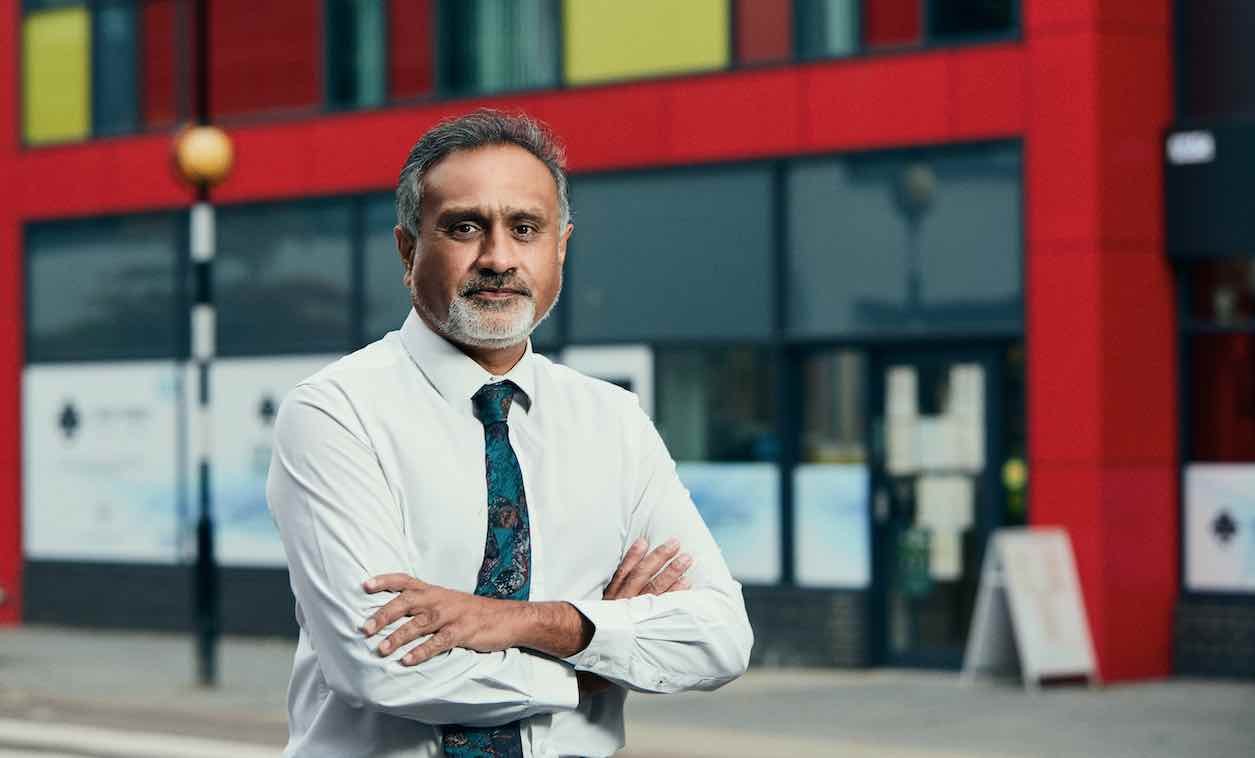In Interviews
Follow this topic
Bookmark
Record learning outcomes
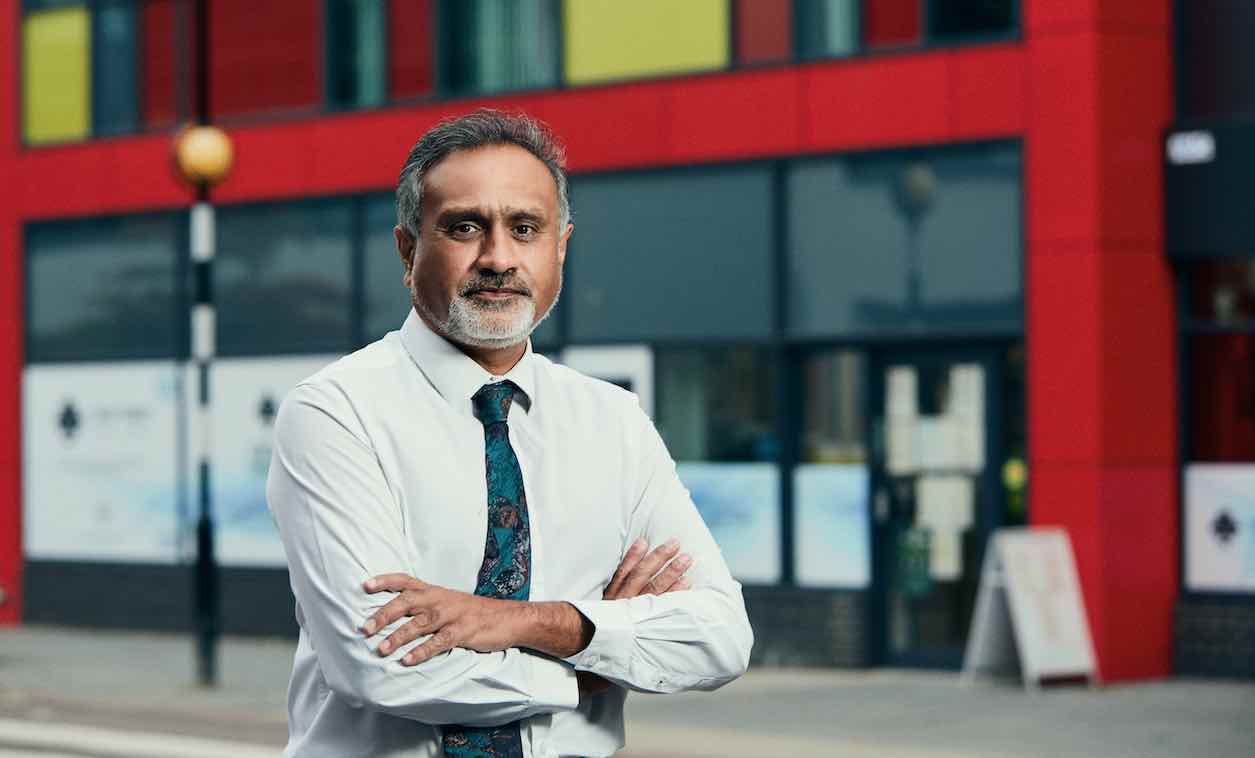
By Rob Darracott
The plaque on the wall just inside the door says Lincoln Pharmacy in St Paul’s Way, Poplar, was officially opened on 4 July 2019 by the professor of particle physics at the University of Manchester, Brian Cox CBE FRS. Behind the plaque is the story of the extraordinary – I use the word in its literal sense – community pharmacist and independent prescriber Atul Patel and his involvement in the St Paul’s Way Transformation Project (SPWTP).
Since 2006, the Project has been transforming the area of Poplar around the street that bears its name from the two run down 60s housing estates rife with ethnic tensions, the barbed wire-protected and shuttered health centre and the fortress school, fenced in and with locked gates, to what it is today. The new £40 million school was first; the health centre was given new management and moved to purpose-built premises in the same building as the relocated pharmacy. Another £40m is currently being spent regenerating the Leopold Estate, including a £2.5m community centre.
Atul was there from the start. In his 2013 phase one report, Andrew Mawson, the social entrepreneur (and now crossbench peer) who instigated the Project, writes of his first scoping visit to St Paul’s Way. “I found two signs of life: Atul Patel is a pharmacist; he has a small pharmacy in a local parade of shops across the road from both the school and the health centre… At our first meeting, I could feel Atul’s positive energy.” Lord Mawson notes the respect Atul had locally and his mentorship of two Bengali students who’d been “inspired by his approach to life and work” and who were considering reading pharmacy at university, after another had already done so.
We live in a box, get in a box car to go to a box office, stare at a box screen, have a box lunch, go back to the box house, have a box dinner most nights and watch a box for entertainment. And then you wonder why we are ill?
“I listened to Atul’s enthusiasm and discovered he was a scientist who was a great communicator with a passion for helping human beings. Why was no one harnessing Atul’s energy and talent for the wider good of the community?” Suffice to say, Lord Mawson decided to harness that energy, and Lincoln Pharmacy became an early partner in the SPWTP.
Atul takes up the story. “The school was in dire straits. Lots of fights, gangs, you name it. With seven foot fences, it was more like a prison, designed to keep people in rather than invite them in for education to stimulate the mind.
“I used to have local kids working for me on a Saturday. One became a pharmacist, one a teacher, one a lawyer. I had no connections with the school, but I was very vocal with the Primary Care Trust. I used to argue ‘don’t judge me as a health professional by giving me targets if you are not going to address the trigger factors for poor health like bad education, lack of jobs, bad housing, no recreational space. No matter how good a health professional I am, you are putting me in an impossible situation.’
“It was Lord Mawson who said we need to make changes and that was the start of the Transformation Project.” As a result of that chance meeting on the street, Atul was invited to what became known as the St Paul’s Way visioning and partnership event, which took place at Stanton Guildhouse in the Cotswolds, a place with historic connections to social entrepreneurship and to the East End. “We spent the weekend brainstorming to create a 25-year vision. We are 18 years in,” Atul says.
I ask what he thinks Lord Mawson and others saw in the pharmacist who wouldn’t shut up in a PCT meeting. “They saw this guy who understands that a health and wellbeing strategy cannot be just about healthcare professionals,” he says. “Andrew said ‘shall we go on a journey’ and I said, ‘I’m ready’.”
Atul sees community pharmacy as a social hub, like the post office used to be. “When they took away the post office, they took social care away. People don’t mind queuing, because that’s when they make connections. Community pharmacy is the same. The plus value is the interaction.”
I tell him about the Tuesday and Thursday queues for pensions and family allowances outside my father’s post office in the 70s. “When people got money directly into their banks, you started to create a couch potato society,” he says. “Online pharmacy is the same. We live in a box, get in a box car to go to a box office, stare at a box screen, have a box lunch, go back to the box house, have a box dinner most nights and watch a box for entertainment. And then you wonder why we are ill?”
Lord Mawson knew he’d found the right stuff to help with the local transformation when when he heard Atul’s history. He came to the UK when his family was thrown out of Idi Amin’s Uganda in 1973. “I was 14. We went from having everything back in Uganda to a refugee camp with a curtain separating families. Dad said: ‘Remember. Tough times don’t last, tough people do. It’s time to have no regrets, but new dreams and new desires and new expectations in life.’ I’ve never forgotten that.”
Don’t minimise the profession. ‘Minor ailments’ is a terrible term. I want a person who comes in to get clinical advice.
Atul had early experience of hard work, although his ‘apprenticeship’ was far from formal. “My uncle used to repair washing machines, Hoovers, fridges. After school at Balham Boys, I’d end up in his workshop. By the age of 16, I could repair everything. By 18 I was doing house calls. When I got my place to do pharmacy at Leicester, he gave me a little mini van – full kit, portable soldering iron, everything. ‘Make use of it when you’re studying’, he said.”
He took the van to Leicester and his entrepreneurial spirit soared. “There was a newsagent opposite where I lived. I told him ‘I want to put an advert in the papers. Appliances repaired, with your number on it. Here’s my lecture timetable. You take the appointments, I’ll give you 10 per cent of my earnings - call out charge £10, thermostat repair £35, vacuum cleaner service £25.’ That newsagent regretted the moment I left Leicester.”
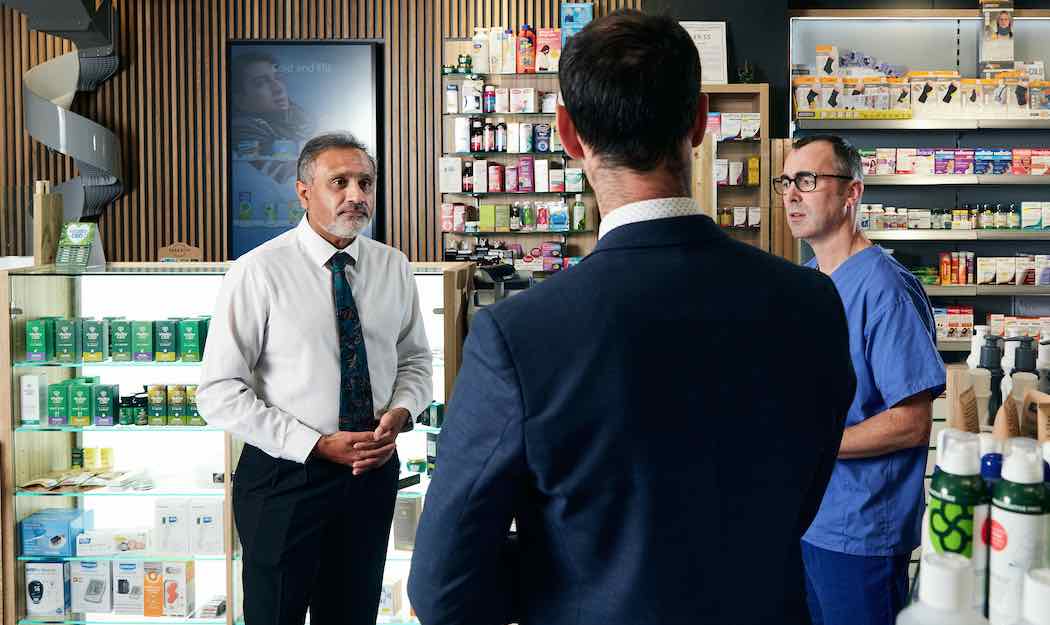 Atul says he decided to pursue a career in pharmacy as it would allow him to be his own person. “I was interested in science, but I was also interested in business.” He worked as a locum for a couple of years – running an electrical repairs business in the evenings – before opening Lincoln Pharmacy in Tower Hamlets, around 100 yards from its present site, in 1985. He acquired a second pharmacy in Southwark in 1998.
Atul says he decided to pursue a career in pharmacy as it would allow him to be his own person. “I was interested in science, but I was also interested in business.” He worked as a locum for a couple of years – running an electrical repairs business in the evenings – before opening Lincoln Pharmacy in Tower Hamlets, around 100 yards from its present site, in 1985. He acquired a second pharmacy in Southwark in 1998.
“My mission statement when I opened my practice was ‘I want to serve my clients to the best of my ability to ease the burden of their disease,” Atul says. “I’ve always called it a practice. Don’t minimise the profession. ‘Minor ailments’ is a terrible term. I want a person who comes in to get clinical advice. It’s advice that’s going to change your life – maybe even save your life in the future.”
Background to a holistic approach
As Atul tells his story, it’s clear that the birth of his son Sachin with severe eczema had a major impact. “Sachin was my paradigm change,” he says. “Here I was, a drug specialist, but I couldn’t help. I read every book on dermatology and I was more confused than ever. But when I took the responsibility to find out the answer for myself, I cleared his skin in three months. A GP who knew Sachin decided to send his patients to me for advice. I thought I had a recipe for eczema. I was getting some successes, but failures too.”
That took Atul to mind-body medicine, which links traditional research methods with holistic healthcare practices. “Treating Sachin, I knew his environment and his emotions. With everyone else I was giving advice to, I did not know their environment or their emotions and this has a huge influence on health outcomes. Your body is a printout of every thought you have, every choice you make in life. Change the way you think and change your choices, you change the printout.
“The skin is the biggest eliminating organ. They say you will grow out of your eczema, but when you stop taking toxins in, they stop coming out and your skin starts to clear. I changed the environment for my son. The carpet was nylon; I changed to wood floors. I took away preservatives, processed foods, even dairy - even a cow doesn't drink cow's milk once it's been weaned. This is why it is so important to know your patient and their families at an emotional level. I believe it is the strength of community pharmacy that the NHS and government are not seeing, but we can help unlock. We need medications to treat the symptoms if people are not willing to change, but we must play our part in influencing that change.”
It is this philosophy that has guided Atul throughout his career. “I practise what I preach,” he says. “If I’m going to teach health then I need to be healthy. My purpose in life is to be a healthy, loving, caring, proud, happy, fun, successful person for myself and others around me. It used to be to be successful and happy, but until I made health my number one purpose my brain was unlikely to make healthy choices or be empowered to take control of my own health. I soon realised that only if I was healthy could I achieve all my ambitions and dreams.”
I said ‘Andrew, if I was at this school and if I wasn’t smoking, drinking or taking drugs, I’d start all three.’
Atul says he’s not had a fever or sore throat in 18 years, and his blood pressure and sugar levels are ‘A1’. He has also tested positive for antibodies to Covid, but had no symptoms. “I don’t say this to impress you but to impress upon you what’s possible. If I am to give healthy living advice I needed to know and experience what that is for myself.
“You are made up of three hundred trillion cells. If you know how to look after one, you can look after them all. The principle is simple. Our choices are based on our beliefs, so correct those first. Health professionals are in a difficult situation. If you feel somebody is drowning, what do you do? You jump in, save that person’s life. No sooner have you done that than you hear two more screams. We are so busy saving lives, we have no time to go upstream to see who’s throwing them in in the first place. We have taught people to believe ‘I have these conditions, now it is your responsibility to take care of me’.”
Team members for change
This philosophy made him a natural fit for the changes envisioned by Andrew Mawson. “He asked me to do an inspection of the school with him. I’d never been in the school,” Atul says. “When we came out, he asked for my opinion. I said ‘Andrew, if I was at this school and if I wasn’t smoking, drinking or taking drugs, I’d start all three.’ He said ‘we need to change’ and I said that was exactly what I’d been saying about health and wellbeing – we need to change the environment – and the journey started.”
Fourteen years later and St Paul’s Way Trust School is a National Teaching School with a unique Faraday learning pathway for science. Part of the University Schools Trust, it is linked to, among others, Queen Mary and Kings, University of London, and the Universities of Warwick, Greenwich and East London. It regularly sends students, many with a Bangladeshi heritage, to Russell Group universities and, more recently, Oxford and Cambridge. After a minor relocation a year ago, Lincoln Pharmacy is directly opposite the school on the ground floor of a building it shares with The Prince’s Trust and new St Paul’s Way Medical Centre.
Phil Akerman, executive headteacher at the school, provides an insight into Atul’s role there. “He’s got an entrepreneurial edge, but it’s really centred on people. He sees everything as interconnected. That’s a rare feature and key for thriving communities,” he says. “Atul gives his time generously on health themes, physical and mental. He’s done assemblies and workshops. He’s talked to our year elevens and our sixth formers during exam periods about stress management. That it’s a member of the community giving that message makes it valuable. It’s not a teacher telling you again. He’s also willing to support the science summer school programme and people can go and have a look at the robot he can’t resist telling a story about.”
He lists family meetings, facilitated work experience, and mock interviews for students applying to university. “It may not sound like much, but it makes a huge difference to a student whose family haven't got a track record. You can get incredibly bright students from a disadvantaged background eclipsed in an interview by average middle-class students because they're more confident in that setting.” he says. “That type of health is invaluable to this school.”
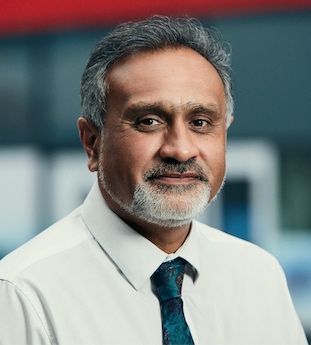 In return, Atul gets a chance to influence generations of schoolchildren. “I said I want to use kids, especially sixth form kids, as my health champions,” says Atul. “Kids have emotional leverage over their parents; the ripple effect kids could create could be enormous.”
In return, Atul gets a chance to influence generations of schoolchildren. “I said I want to use kids, especially sixth form kids, as my health champions,” says Atul. “Kids have emotional leverage over their parents; the ripple effect kids could create could be enormous.”
He has been working on a structured health educational programme with the school, but Covid has delayed things. He’s certainly got plenty of ideas, many of them challenging social norms. “We say have a hearty breakfast, but what does the word itself mean? You should break the fast with the lightest meal to start your day, but have the heartiest lunch,” he says.
“I remember [former health minister] Earl Howe coming here. I told him health promotion leaflets, five fruits, six vegetables are a waste of time; you need to create a health educational programme that fits the person. He asked what I meant. I said if you’re an athlete you need your carbs, but if you’re a bus driver and you eat the same, you’re not going to burn it, you’re going to wear it.” He told the minister that pharmacy has the skilled health champions he was looking for, but it needs investment to create the environment to give patients the time they need for tailored living advice.
Atul has a close working relationship with Dr Joe Hall, the clinical lead at St Paul’s Way Medical Centre and chair of the governors at the school. Their first meeting strikes a chord. “He was one of the first people I met on the street when we took over the surgery,” Dr Hall says. “He’s an inspiration, incredibly energetic, we got on really quickly.
“He champions community pharmacies and we work really closely together. I helped him get his accreditation for independent prescribing and he did work in the surgery. He helps teach some of the medical students we have and they get to see how the pharmacy works. By having a collaborative approach, we join up the care of the community.
“Lots of changes have hit the NHS locally, so it’s great to have someone you can have coffee with to chat about how we can develop care jointly.” Atul says he used to do clinics for the practice but couldn’t go full time; they are now discussing running clinics in the pharmacy to provide opportunities for more early interventions.
I was inspired to use my independent prescribing skills and be that second pharmacist patients could see
Lincoln Pharmacy certainly offers a model for a person-centred practice. Three consulting rooms, a robot, large touchscreens that allow staff to display and select medicines mid-conversation. The staff, too, reflect a life’s commitment to community. Rehan Ahmed, a local who did his pre-registration training with Atul, is now a key member of the team, working across the two practices. There are apprentices, a pharmacist from Bangladesh working through his UK qualifications. Olga, a pharmacist from Poland, did her training in the pharmacy too.
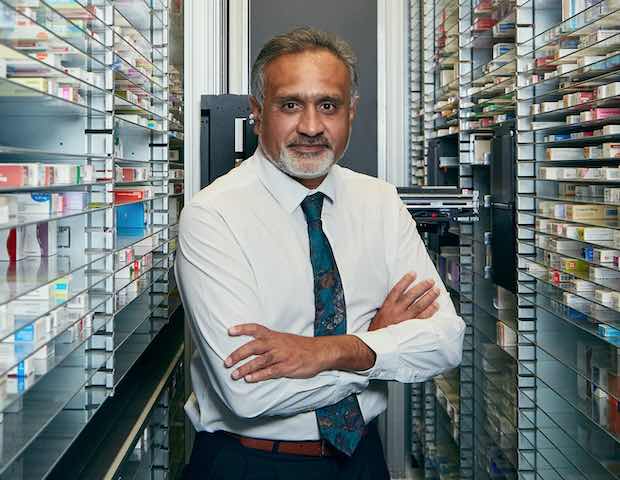 Son Sachin, who has a degree in business with entrepreneurship, is now business manager and managing director. Aditya, who first helped out in the pharmacy when he was nine years old, did his work experience with Atul, then a Saturday job and is now back as the pharmacy’s pre-reg. Atul’s brother Piyush is a director of the business and manager of the pharmacy. Sixteen-year old Leah is about to join the team as an apprentice. “She just walked in, wanted to work here, that’s good enough for me. We are always looking for local kids,” Atul says.
Son Sachin, who has a degree in business with entrepreneurship, is now business manager and managing director. Aditya, who first helped out in the pharmacy when he was nine years old, did his work experience with Atul, then a Saturday job and is now back as the pharmacy’s pre-reg. Atul’s brother Piyush is a director of the business and manager of the pharmacy. Sixteen-year old Leah is about to join the team as an apprentice. “She just walked in, wanted to work here, that’s good enough for me. We are always looking for local kids,” Atul says.
“This pandemic has proved we are able to deliver. I was inspired to use my independent prescribing skills and be that second pharmacist patients could see because I couldn’t prescribe and dispense. Yes, I might lose money, but I want to prove to the NHS that pharmacists and pharmacy contractors are patient-focused and put the needs of patients first.”
He and his brother erected screens – the frames are made from decking – before the guidelines arrived.
Adapting to patient needs
There is clearly no such thing as a normal day for Atul. He might do some coaching, see patients privately in either pharmacy. “We had a guy come in saying he couldn’t start his job with the Met Police unless he’d had a hepatitis B jab. Another pharmacy had pulled out. As soon as I as did it for him, all the other cadets were sent to me as well. It’s a typical day for me when something unexpected comes because I’m there ready to deliver.”
Our conversation is wide ranging. We touch on delivering detox programmes, food pyramids, a holistic approach – he teaches his clients meditation and does half an hour himself first thing every morning; he also teaches breathing exercises. He’s a fan of rebounders. “It’s a small trampoline; keeps the lymphatic system moving and in a healthier state.” He’s a blood microscopy practitioner – I’ve never seen a microscope in a pharmacy, let alone one in regular use.
Atul relaxes by painting. “After we got married, my wife said ‘we need paintings for the walls’. I told her we cannot afford to buy, I’ll start painting them.” The family now buy him canvases for Christmas. And he had a pilot’s licence for a while.
Next for the business, he is interested in aesthetics – or rather he’s been persuaded to be. “Sachin is saying ‘there are a lot of cowboys out there. People are going to go somewhere, but if you do it, you can apply the mind-body medicine element to the therapy’. He changed my mind. Me and my daughter Serena – a GP in Lewisham – and my newly qualified pharmacist niece Shree, will add the ‘plus’ to the aesthetics service.”
This pharmacy is my family’s investment in what I believe delivering future healthcare is all about
I have to ask about Brian Cox and that plaque. “He had flown in from Australia that day I think, but he wanted to be here,” Atul explains. “I have known Brian for more than nine years. He is inspirational for kids. He was in a band, then went to do physics and is now a professor and a big TV celebrity. He’s an amazing person. Andrew Mawson is the link – they must have chatted somewhere.”
Professor Cox was the first patron of the St Paul’s Way Trust School and has hosted all nine of its science summer schools since their inception in 2011. The schools aim to inspire young people to pursue careers in STEAM (science, technology, engineering, arts and maths) and become the next generation of Britain’s scientists. “He brings eminent speakers – last year we had the engineer who designed the Mars Rover – to inspire kids, not just from this school but now from others too,” Atul says. “I help with meetings, planning the day, hosting guest speakers and telling them the story of our journey to date and also help encourage parents to participate in the events and their children’s education. There are over 300 kids in the auditorium – it is amazing.”
Atul shows me photographs from the opening ceremony. He was glad his mother was there to see this most modern of pharmacies open; she was his first member of staff back in 1985. “My mum came to work for almost two years when I was starting as I couldn’t afford staff, doing full nine to seven shifts, including Saturdays” he says. “When I got somebody in the afternoon she'd spend the morning with me and go back home on the train in the afternoon. People can see where we are today, but they can’t imagine the journey that has brought us here. I always sum it up in the words of [early 20th century English philosophical writer] James Allen: ‘the vision that you glorify in your mind, the ideal that you enthrone in your heart, this is what you will live your life by. This is what you will become’.
“This pharmacy is my family’s investment in what I believe delivering future healthcare is all about,” Atul says. “We have a state of the art pharmacy with an amazing team, where clients can feel safe and confident to come for their health needs. I now need the NHS to invest in me and them.”
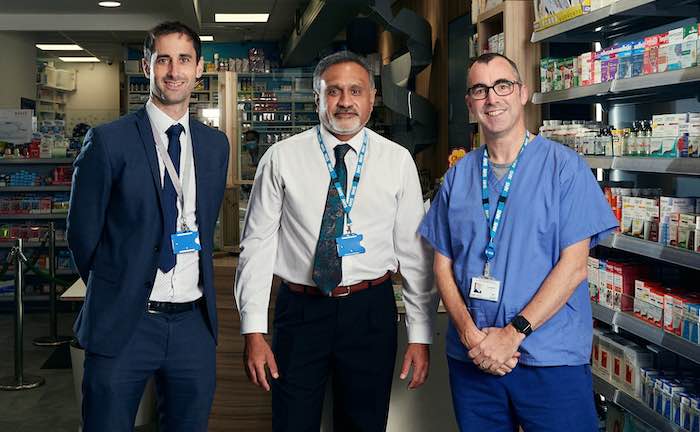
Further information on the St Paul's Way Transformation Project and Andrew Mawson Partnerships can be found here

